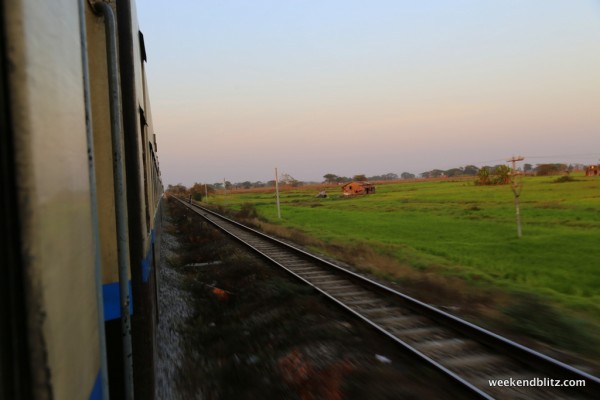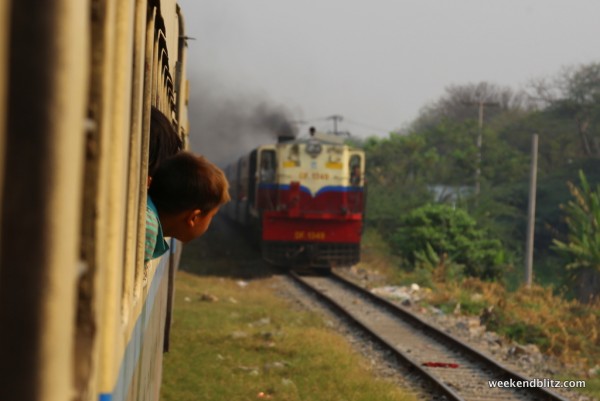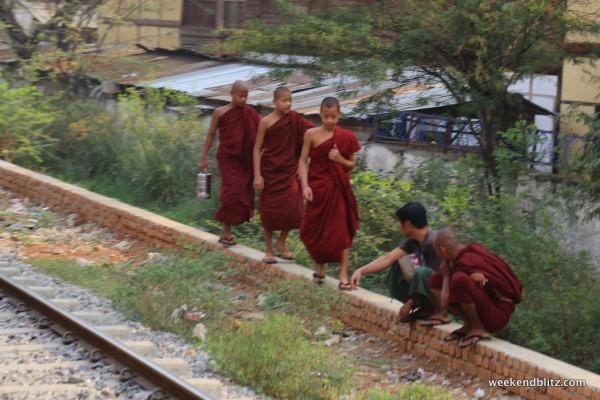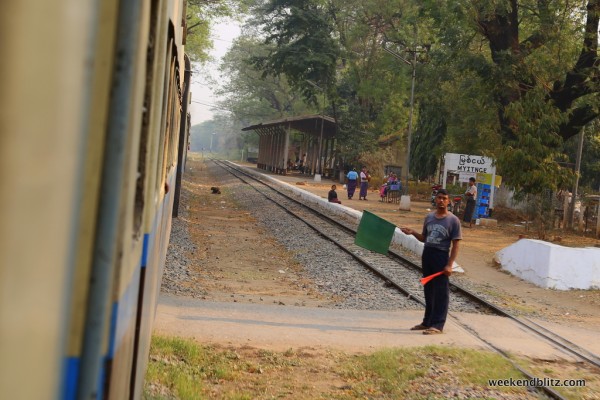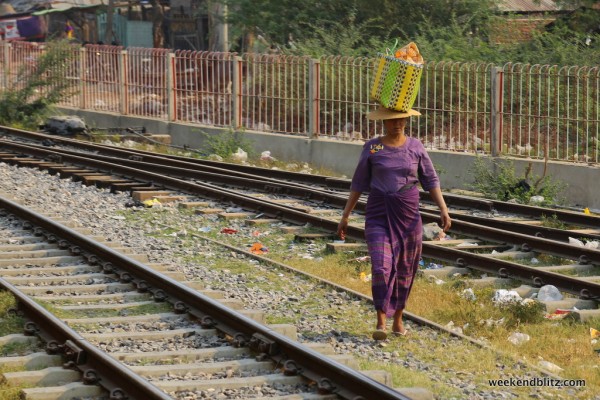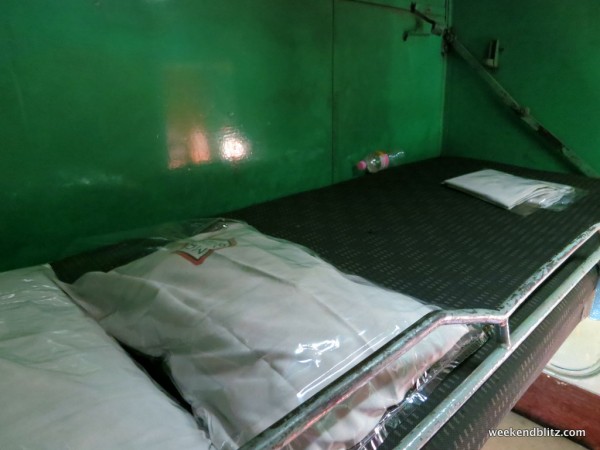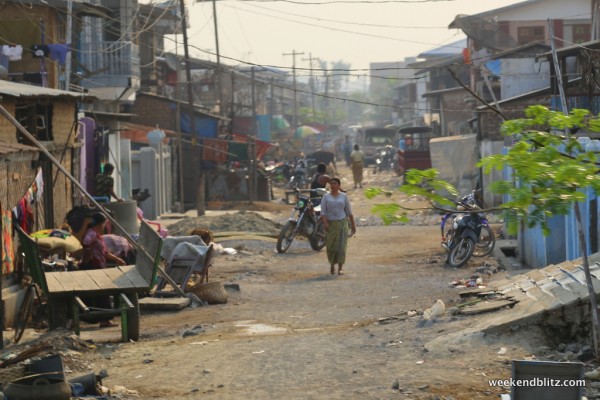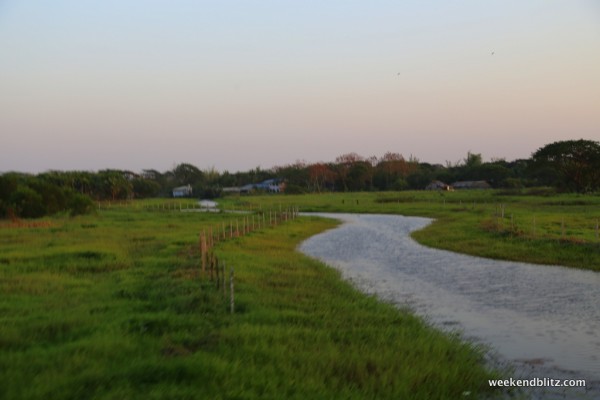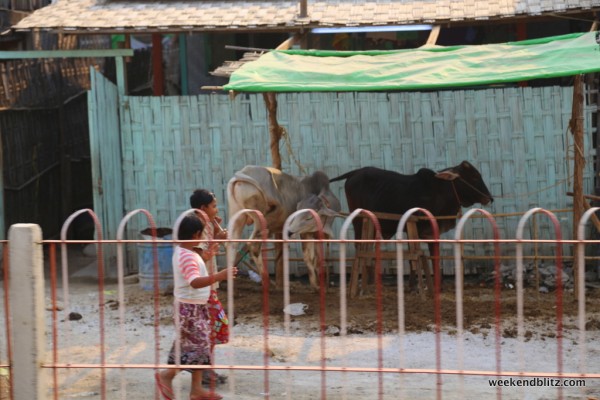Myanmar Railways Train # 3(Up): Yangon to Mandalay

Disclaimer: I can sometimes write with an air of sarcasm, so please do not be put off by this! This trip was a thoroughly fantastic experience and we are glad that we have the memories from this train ride.
After taking a trip to the Myanmar Railways Booking Office a few days prior to book our tickets, it was departure day and we caught a cab to the Yangon Central Railway. Due to the traffic, car travel is only marginally faster than walking and, if it weren’t for our bags and the excruciating heat, we would have used the latter option this day. We made it to the station around 4:15pm, about 45 mins prior to departure.
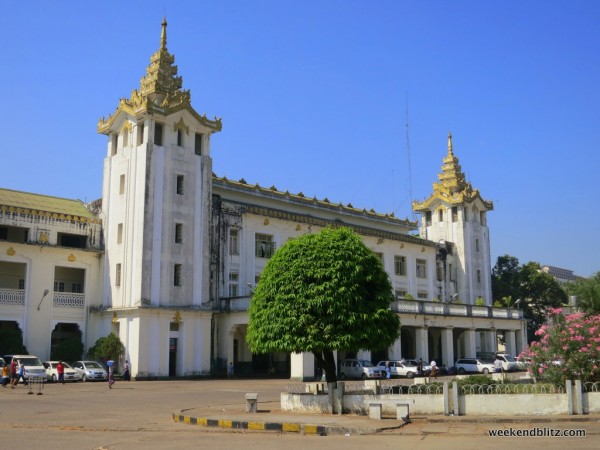
The train station, like most in the world, is a vibrant place with lots of hustle and bustle. There are a handful of small shops in the station and we took the opportunity to grab a gallon of water and a few snacks, unaware of what we might find food-wise on the train.
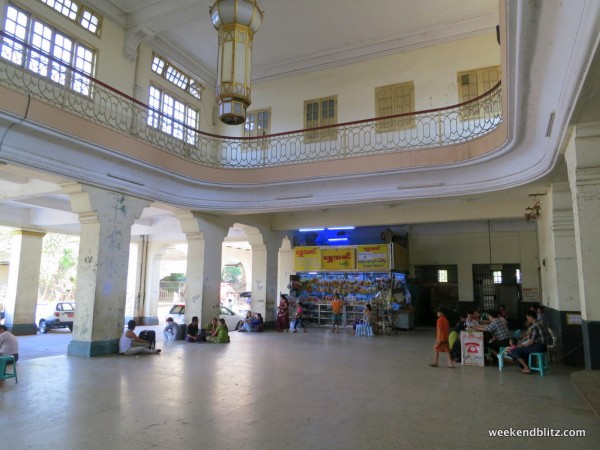
A few kiosks to load up on snacks and water
Ticket sales for same day travel
BOARDING
After waiting around for about 15 minutes, our train rolled into the station and we passed through the “secure” area.
We got basically mobbed by a few guys that ran up to us wearing uniforms and tried to grab our tickets and bags; not really understanding what was going on, I waved them off the first time and then they came back and insisted on helping us. I guess this is the guy that shows us to the right car and cabin? I handed him our tickets (he was in uniform) and he grabbed our bag with water bottles and snacks, but not our luggage bags…? The cabin was extremely simple to find as we were only about 25 yards away at the time. Once they led us to our cabin (the first one on the car), the two guys dropped our bags and then came the inevitable shakedown: hands are out begging for cash. I handed them 1,000 kyat each (~$1 USD), quite a generous offer for a 25 yard walk with our bottled water. And so it began, the pushiest money grab yet from our time in Myanmar. They said no, 10,000 kyat each (= to about $10 US each). I’m glad we’d been here long enough to realize this to be completely asinine. We had to stand our ground and keep repeating no more. They came down to 5,000 each… “nope”… ok 2,000 each… “nope, we’re good”… until they finally left, what a racket!
But it doesn’t stop here. The chaos is actually just beginning, unbeknownst to us. Until this point, we’ve found the vendors in Yangon to be much less pushy than other countries we’ve visited; they’re worse in Istanbul, Bangkok etc… until this train ride. I guess a few have just learned the tricks of the trade when Westerners approach the train. And, it seems to be working because they keep showing up. The next round were the fruit, snack and drink vendors and they came by the dozens. Many have also learned the art of sending their cute children to do their dirty work—not going to work on me. But, they were relentless. I glanced down at the watch when one little girl plopped herself down in our cabin, begging for us to buy oranges from her: 4:35pm, about 25 more minutes of this before the train horn sounds and the street people jump off. It was quite overwhelming, we finally shut the door and had to literally hold it shut because they were trying to open the locked door.
And, to confuse things even more, in the middle of this barrage of street vendors peddling anything and everything, a man came in with a menu and asked what we wanted to eat. I mean, does he work for the train? Is he a different street vendor? Who knows?!?! While he had a printed menu and uniform that looked semi-official, so did the baggage handlers, so I don’t know who to trust anymore. We put in our order and he said it’d be ready at about 7pm. Shortly after (and still before the train has started moving), another guy came around asking us about food; I was just waiting for someone to hit us up for cash for this meal but was determined to not pay a dime until we had left the station and restored some sense of calm once the Yangon-based street vendors had jumped off.
When the train finally took off and the dozens of vendors piled off, we were only then able to settle in to our cabin and figure out which way was up.
“UPPER CLASS SLEEPER” CABIN
We had the foreword-most cabin in our car, cabin “F”, with a corner door, which is nice because you can see people coming down the aisle from the next car.
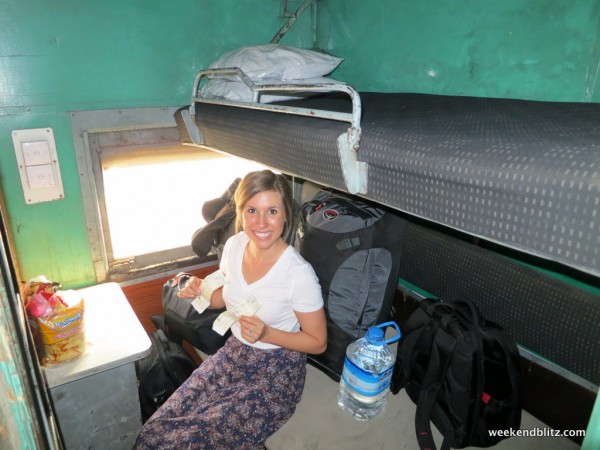
We had one of the 2 two-berth cabins, the rest were all 4-berth. In all, my count was four 4-berth cabins + two 2-berth cabins for a total of 20 sleeper beds per train.
It appeared that we were the only sleeper car on the train; with 6 cabins per car and just 2 departures per day to Mandalay, you can see if you’re a little late to the booking in high tourist season that you could be left hanging out to dry if you’re hoping to book a sleeper cabin… especially since you can only start booking 5 days out from departure. More details on booking your tickets can be found here: How-to: Booking a Train Ticket on Myanmar Railways.
The cabin conditions, in short, were very run down with lots of wear and tear. Each bed had a plastic-wrapped pillow and a set of sheets, both of which appear to be relatively clean (especially when compared to the mattress). At this point, we were feeling pretty good about our travel-liner sleeping bags we’d brought with us!
Plastic wrapped pillows and sheets + a random water bottle from the last passenger
The upper bunk was folded down when we entered and all of our attempts to fold it back up were futile. I’m assuming that some point over the course of its long, long life, the upper-berth would have flipped up and we would have been able to latch it properly, but that must have been ages ago. In its current state, with parts of the steel frame jutting out left and right, that is simply impossible.
The cabin also had one single fluorescent light and a big fan with little in the way of a safety grate. We had a long debate about who was going to be relegated to the top bunk and run the risk of having a limb chopped off in his/her sleep after accidentally raising a hand up at night (I lost but am pleased to say I still have all digits).
There was no A/C on the train, but it was quite pleasant on our entire journey. The high for the day in Yangon was 103 but the low dipped down to 71 which makes for a rather comfortable ride with the window open all the way and the wind blowing in your hair.
Speaking of the wind blowing in our hair, this was great… until about hour 14 of the train ride when I realized just how much dust the train had been accumulating on our clothes, in our cabin and, with the help of a sneeze, in our nostrils. By hour 16, I had completely lost my voice because of all the dust I had inhaled (partly because I hung my head out of the window at several of the stops)… and didn’t get my voice back until about 3 or 4 days later.
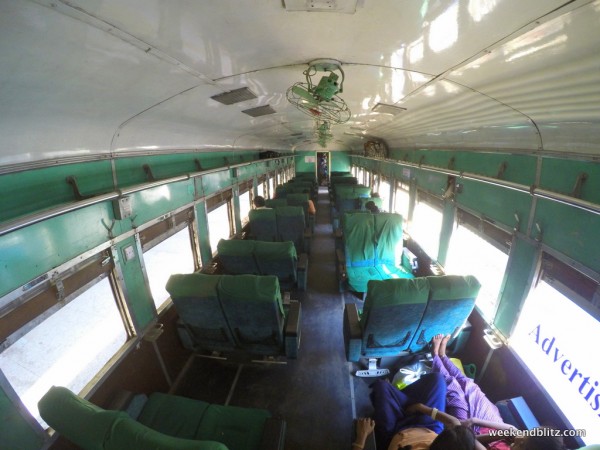
“Upper Class” seats
BATHROOM
The bathroom situation was interesting to say the least and got increasingly interesting when just trying to approach forced you to walk through a dripping door way (AND you had to jump train cars… more on that life-threatening option later). The closest bathroom to our cabin was actually the “Upper Class” seating bathroom and, for a while, what we assumed to be the only one. It was simply a Turkish toilet that went straight down, as in you can see the track flying past you beneath. The flushing system consisted of a water tank on top of the bathroom car that sent gravity-fed water to a bucket that you could twist a valve and refill. Pretty awesome.
Gentlemen, better wear some boots as you WILL piss all over your feet. Ladies, no advice, but I’m sure it sucks more for you.
After a trip to the other side of our car, we found the actual restroom that we were to be using and, while it had an actual toilet in it, it wasn’t much better.
THE RIDE
If whiplash dust-bowl doesn’t accurately describe the ride, I’ll let the fellow passenger we met from Thailand take a crack at it: “this train is more bumpy than riding a wild horse.” This is the same man that poked his head in at the beginning of the trip to ask if our fan was working– when I confirmed that, no, it was not, he looked perturbed and seemed very concerned that it might not work. I didn’t know where the man was from at first (he could have been Burmese for all I knew) but I was surprised when I saw him rolling his eyes about the fan. I guess for him, being from Thailand and traveling in much more rural Myanmar, it’s no different than the city slicker from New York headed to rural Alabama to find that they do everything a bit “backwards” (but really just different) there and to be a little annoyed.
Quick digression:
From the limited knowledge I have about the U.S. railroads and Amtrak, the ride is somewhat bumpy and slow (i.e. the max speed is 80 mph) on all of the lines except for the northeast corridor. The majority of the US railroads were built in the 19th century with wooden railroad ties that simply can’t support the faster speeds. In the Northeast corridor where the track is owned by Amtrak, however, they use concrete railroad ties and thus Amtrak’s Acela can travel at speeds higher than 80 mph. So, here’s the part that confused me: when I look to my right out of the window, I saw nothing but concrete railroad ties yet this is far and away the bumpiest train I’ve ever been on with an average speed of about 25 mph. How can this be? Maybe they didn’t lay the track straight? Or the train stock and locomotives are the part contributing to the rough ride? Either way, it doesn’t make sense to me and seems like they have all they need to make the same 16-hour journey in about 4 hours flat by increasing speeds to 100 mph on average.
The train ride was, at the very least, life threatening with the amount (and severity) of the bumps and shakes. The scariest part was going from car to car and I’m not exaggerating when I say you were taking your life into you hands. If you made it past the car change, each car door’s door was flung wide open with no way to close it, so, once you made it through the switch from car to car, you ran the risk of getting jolted straight out of the train itself through the open door.
All of that being said, the ride and scenery was fantastic. Part of the upside of going just 25 mph (40 km/hr) was that we were able to see a lot of the countryside and the local people as we rolled by.
We gained a good number of people during our stops through the night, many people were stretched out in the corners of our car (not cabin, thankfully!).
The train felt very safe (I think?) due to the amount of men in police/military uniforms. I say “I think?” because, in developing countries, uniformed men can also mean bad things for tourists since we’re possible victims to use the tools of corruption and power to illicit bribes. In this case, we were fine and this continued to be our experience during our full 15 days in Myanmar. The uniformed men were likely just transiting from city to city, not necessarily on duty for the safety of the train.
DINING CAR
Our cabin is about 3 cars behind the dining car. Having already ordered our meal when we first boarded, our “cabin attendant” (which might be an oversell but I lack a better word) came around 6:45pm and said our meal was about ready. Nervous about leaving our room unattended for too long, we packed up all of the valuables in backpacks and managed to lock our cabin with a mini-luggage lock that provided an invaluable amount of peace of mind. If something grew legs and walked out of the cabin, there’d be no recovering it… especially since it would probably “walk” on down to the ordinary car that was jam-packed with people.
The dining car, like everything so far, was an experience. Judging from the amount of passengers actually sitting in the dining car, and the number of plates being walked out of the car, I quickly realized that at-seat delivery is the preferred choice for a meal on this train.
Things in the dining car: the car attendants, our two—likely Michelin-starred—chefs and lots of chain smoking passengers. It wasn’t until our stint in the dining car that I added up how in the world the snack peddlers had a market for selling cigarettes in a non-smoking train: anything goes in the dining car.
Once we got settled in, our food, despite being “ready now”, took quite awhile, further adding to the (absurd) paranoia that they were stalling while an accomplice was pouring through the contents of our bags in the cabin.Neither one of us was willing to take the several-car journey during the meal to check on our bags. Again, quite an absurd thought but nonetheless, the thought ran through our minds several times.
Dinner was finally served. I ordered the “Sour and Spicy Chicken” which was a perfectly fine meal with cauliflower, carrots, bell peppers, onions, broccoli and chicken. It wasn’t very spicy at all (unfortunately) and we were a bit concerned that it wasn’t piping hot having been warned against eating chicken that ran the risk of being undercook. Oh well, I was hungry and this was infinitely better than any of the crackers and cookies in our cabin.
We also tried the “Fried Noodles (with chicken pork)” which, as it turned out, was a meatless choice. We deemed this to be the safer bet as it had no chicken after all and simply tasted like like salty, saucy fried noodles. Not a culinary delight but also quite innocuous.
All said and done, dinner on the train set us back 8,500 kyat (~$8.50 US) and was a welcomed, warm meal that tasted absolutely fine and, in the end, didn’t get either of us sick.
TRAIN RIDE STATS AND MAP
BOTTOM LINE: This bumpy and sleepless overnight train was both the cheapest and most authentically Burmese way to travel across the country–for $12.50/person we’d suggest you give it a try but don’t forget the dramamine if you get motion sick!
-----------------------------------
Full post with proper formatting and photo gallery can be found here: Weekend Blitz - Myanmar Railways Train # 3(Up): Yangon to Mandalay

Disclaimer: I can sometimes write with an air of sarcasm, so please do not be put off by this! This trip was a thoroughly fantastic experience and we are glad that we have the memories from this train ride.
After taking a trip to the Myanmar Railways Booking Office a few days prior to book our tickets, it was departure day and we caught a cab to the Yangon Central Railway. Due to the traffic, car travel is only marginally faster than walking and, if it weren’t for our bags and the excruciating heat, we would have used the latter option this day. We made it to the station around 4:15pm, about 45 mins prior to departure.

The train station, like most in the world, is a vibrant place with lots of hustle and bustle. There are a handful of small shops in the station and we took the opportunity to grab a gallon of water and a few snacks, unaware of what we might find food-wise on the train.

A few kiosks to load up on snacks and water
Ticket sales for same day travel
BOARDING
After waiting around for about 15 minutes, our train rolled into the station and we passed through the “secure” area.
We got basically mobbed by a few guys that ran up to us wearing uniforms and tried to grab our tickets and bags; not really understanding what was going on, I waved them off the first time and then they came back and insisted on helping us. I guess this is the guy that shows us to the right car and cabin? I handed him our tickets (he was in uniform) and he grabbed our bag with water bottles and snacks, but not our luggage bags…? The cabin was extremely simple to find as we were only about 25 yards away at the time. Once they led us to our cabin (the first one on the car), the two guys dropped our bags and then came the inevitable shakedown: hands are out begging for cash. I handed them 1,000 kyat each (~$1 USD), quite a generous offer for a 25 yard walk with our bottled water. And so it began, the pushiest money grab yet from our time in Myanmar. They said no, 10,000 kyat each (= to about $10 US each). I’m glad we’d been here long enough to realize this to be completely asinine. We had to stand our ground and keep repeating no more. They came down to 5,000 each… “nope”… ok 2,000 each… “nope, we’re good”… until they finally left, what a racket!
But it doesn’t stop here. The chaos is actually just beginning, unbeknownst to us. Until this point, we’ve found the vendors in Yangon to be much less pushy than other countries we’ve visited; they’re worse in Istanbul, Bangkok etc… until this train ride. I guess a few have just learned the tricks of the trade when Westerners approach the train. And, it seems to be working because they keep showing up. The next round were the fruit, snack and drink vendors and they came by the dozens. Many have also learned the art of sending their cute children to do their dirty work—not going to work on me. But, they were relentless. I glanced down at the watch when one little girl plopped herself down in our cabin, begging for us to buy oranges from her: 4:35pm, about 25 more minutes of this before the train horn sounds and the street people jump off. It was quite overwhelming, we finally shut the door and had to literally hold it shut because they were trying to open the locked door.
And, to confuse things even more, in the middle of this barrage of street vendors peddling anything and everything, a man came in with a menu and asked what we wanted to eat. I mean, does he work for the train? Is he a different street vendor? Who knows?!?! While he had a printed menu and uniform that looked semi-official, so did the baggage handlers, so I don’t know who to trust anymore. We put in our order and he said it’d be ready at about 7pm. Shortly after (and still before the train has started moving), another guy came around asking us about food; I was just waiting for someone to hit us up for cash for this meal but was determined to not pay a dime until we had left the station and restored some sense of calm once the Yangon-based street vendors had jumped off.
When the train finally took off and the dozens of vendors piled off, we were only then able to settle in to our cabin and figure out which way was up.
“UPPER CLASS SLEEPER” CABIN
We had the foreword-most cabin in our car, cabin “F”, with a corner door, which is nice because you can see people coming down the aisle from the next car.

We had one of the 2 two-berth cabins, the rest were all 4-berth. In all, my count was four 4-berth cabins + two 2-berth cabins for a total of 20 sleeper beds per train.
It appeared that we were the only sleeper car on the train; with 6 cabins per car and just 2 departures per day to Mandalay, you can see if you’re a little late to the booking in high tourist season that you could be left hanging out to dry if you’re hoping to book a sleeper cabin… especially since you can only start booking 5 days out from departure. More details on booking your tickets can be found here: How-to: Booking a Train Ticket on Myanmar Railways.
The cabin conditions, in short, were very run down with lots of wear and tear. Each bed had a plastic-wrapped pillow and a set of sheets, both of which appear to be relatively clean (especially when compared to the mattress). At this point, we were feeling pretty good about our travel-liner sleeping bags we’d brought with us!
Plastic wrapped pillows and sheets + a random water bottle from the last passenger
The upper bunk was folded down when we entered and all of our attempts to fold it back up were futile. I’m assuming that some point over the course of its long, long life, the upper-berth would have flipped up and we would have been able to latch it properly, but that must have been ages ago. In its current state, with parts of the steel frame jutting out left and right, that is simply impossible.
The cabin also had one single fluorescent light and a big fan with little in the way of a safety grate. We had a long debate about who was going to be relegated to the top bunk and run the risk of having a limb chopped off in his/her sleep after accidentally raising a hand up at night (I lost but am pleased to say I still have all digits).
There was no A/C on the train, but it was quite pleasant on our entire journey. The high for the day in Yangon was 103 but the low dipped down to 71 which makes for a rather comfortable ride with the window open all the way and the wind blowing in your hair.
Speaking of the wind blowing in our hair, this was great… until about hour 14 of the train ride when I realized just how much dust the train had been accumulating on our clothes, in our cabin and, with the help of a sneeze, in our nostrils. By hour 16, I had completely lost my voice because of all the dust I had inhaled (partly because I hung my head out of the window at several of the stops)… and didn’t get my voice back until about 3 or 4 days later.

“Upper Class” seats
BATHROOM
The bathroom situation was interesting to say the least and got increasingly interesting when just trying to approach forced you to walk through a dripping door way (AND you had to jump train cars… more on that life-threatening option later). The closest bathroom to our cabin was actually the “Upper Class” seating bathroom and, for a while, what we assumed to be the only one. It was simply a Turkish toilet that went straight down, as in you can see the track flying past you beneath. The flushing system consisted of a water tank on top of the bathroom car that sent gravity-fed water to a bucket that you could twist a valve and refill. Pretty awesome.
Gentlemen, better wear some boots as you WILL piss all over your feet. Ladies, no advice, but I’m sure it sucks more for you.
After a trip to the other side of our car, we found the actual restroom that we were to be using and, while it had an actual toilet in it, it wasn’t much better.
THE RIDE
If whiplash dust-bowl doesn’t accurately describe the ride, I’ll let the fellow passenger we met from Thailand take a crack at it: “this train is more bumpy than riding a wild horse.” This is the same man that poked his head in at the beginning of the trip to ask if our fan was working– when I confirmed that, no, it was not, he looked perturbed and seemed very concerned that it might not work. I didn’t know where the man was from at first (he could have been Burmese for all I knew) but I was surprised when I saw him rolling his eyes about the fan. I guess for him, being from Thailand and traveling in much more rural Myanmar, it’s no different than the city slicker from New York headed to rural Alabama to find that they do everything a bit “backwards” (but really just different) there and to be a little annoyed.
Quick digression:
From the limited knowledge I have about the U.S. railroads and Amtrak, the ride is somewhat bumpy and slow (i.e. the max speed is 80 mph) on all of the lines except for the northeast corridor. The majority of the US railroads were built in the 19th century with wooden railroad ties that simply can’t support the faster speeds. In the Northeast corridor where the track is owned by Amtrak, however, they use concrete railroad ties and thus Amtrak’s Acela can travel at speeds higher than 80 mph. So, here’s the part that confused me: when I look to my right out of the window, I saw nothing but concrete railroad ties yet this is far and away the bumpiest train I’ve ever been on with an average speed of about 25 mph. How can this be? Maybe they didn’t lay the track straight? Or the train stock and locomotives are the part contributing to the rough ride? Either way, it doesn’t make sense to me and seems like they have all they need to make the same 16-hour journey in about 4 hours flat by increasing speeds to 100 mph on average.
The train ride was, at the very least, life threatening with the amount (and severity) of the bumps and shakes. The scariest part was going from car to car and I’m not exaggerating when I say you were taking your life into you hands. If you made it past the car change, each car door’s door was flung wide open with no way to close it, so, once you made it through the switch from car to car, you ran the risk of getting jolted straight out of the train itself through the open door.
All of that being said, the ride and scenery was fantastic. Part of the upside of going just 25 mph (40 km/hr) was that we were able to see a lot of the countryside and the local people as we rolled by.
We gained a good number of people during our stops through the night, many people were stretched out in the corners of our car (not cabin, thankfully!).
The train felt very safe (I think?) due to the amount of men in police/military uniforms. I say “I think?” because, in developing countries, uniformed men can also mean bad things for tourists since we’re possible victims to use the tools of corruption and power to illicit bribes. In this case, we were fine and this continued to be our experience during our full 15 days in Myanmar. The uniformed men were likely just transiting from city to city, not necessarily on duty for the safety of the train.
DINING CAR
Our cabin is about 3 cars behind the dining car. Having already ordered our meal when we first boarded, our “cabin attendant” (which might be an oversell but I lack a better word) came around 6:45pm and said our meal was about ready. Nervous about leaving our room unattended for too long, we packed up all of the valuables in backpacks and managed to lock our cabin with a mini-luggage lock that provided an invaluable amount of peace of mind. If something grew legs and walked out of the cabin, there’d be no recovering it… especially since it would probably “walk” on down to the ordinary car that was jam-packed with people.
The dining car, like everything so far, was an experience. Judging from the amount of passengers actually sitting in the dining car, and the number of plates being walked out of the car, I quickly realized that at-seat delivery is the preferred choice for a meal on this train.
Things in the dining car: the car attendants, our two—likely Michelin-starred—chefs and lots of chain smoking passengers. It wasn’t until our stint in the dining car that I added up how in the world the snack peddlers had a market for selling cigarettes in a non-smoking train: anything goes in the dining car.
Once we got settled in, our food, despite being “ready now”, took quite awhile, further adding to the (absurd) paranoia that they were stalling while an accomplice was pouring through the contents of our bags in the cabin.Neither one of us was willing to take the several-car journey during the meal to check on our bags. Again, quite an absurd thought but nonetheless, the thought ran through our minds several times.
Dinner was finally served. I ordered the “Sour and Spicy Chicken” which was a perfectly fine meal with cauliflower, carrots, bell peppers, onions, broccoli and chicken. It wasn’t very spicy at all (unfortunately) and we were a bit concerned that it wasn’t piping hot having been warned against eating chicken that ran the risk of being undercook. Oh well, I was hungry and this was infinitely better than any of the crackers and cookies in our cabin.
We also tried the “Fried Noodles (with chicken pork)” which, as it turned out, was a meatless choice. We deemed this to be the safer bet as it had no chicken after all and simply tasted like like salty, saucy fried noodles. Not a culinary delight but also quite innocuous.
All said and done, dinner on the train set us back 8,500 kyat (~$8.50 US) and was a welcomed, warm meal that tasted absolutely fine and, in the end, didn’t get either of us sick.
TRAIN RIDE STATS AND MAP
BOTTOM LINE: This bumpy and sleepless overnight train was both the cheapest and most authentically Burmese way to travel across the country–for $12.50/person we’d suggest you give it a try but don’t forget the dramamine if you get motion sick!
-----------------------------------
Full post with proper formatting and photo gallery can be found here: Weekend Blitz - Myanmar Railways Train # 3(Up): Yangon to Mandalay
Last edited by a moderator:




